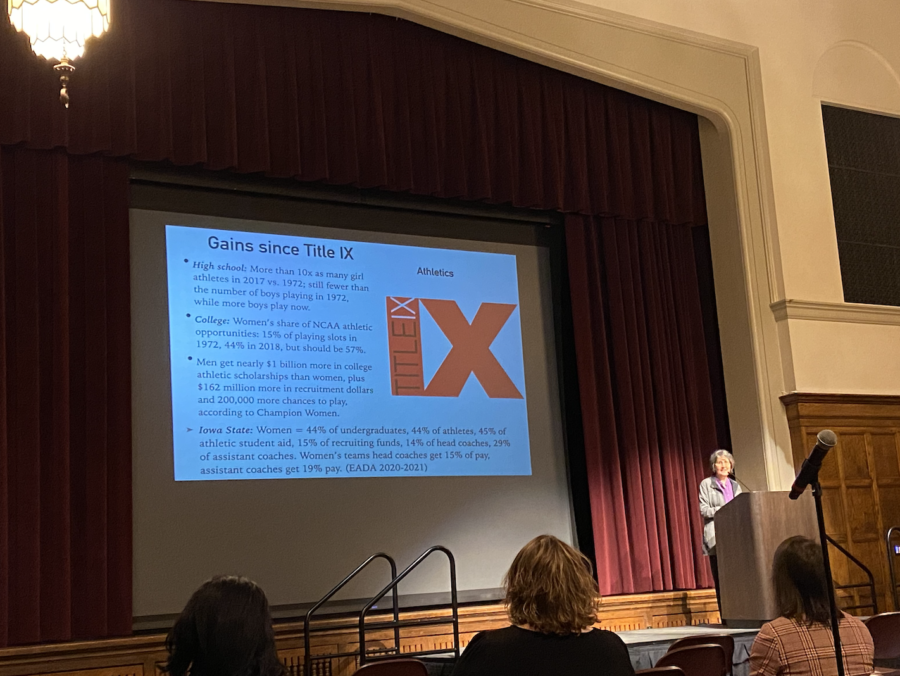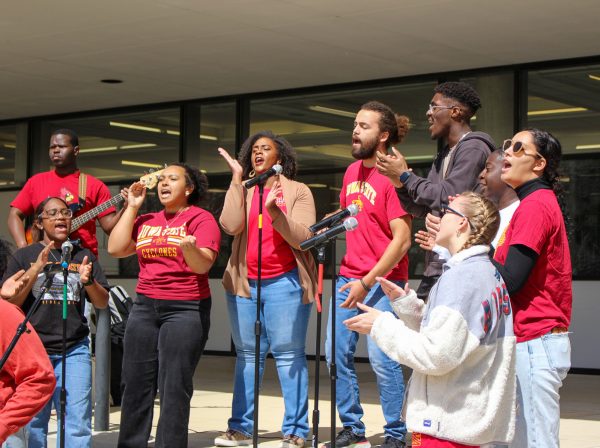Tool for activism: journalist and author shares the history of Title IX
Sherry Boschert discusses her book on title IX, its history and offers the audience resources to learn more.
Award winning journalist and author Sherry Boschert shared the history of Title IX and stories in her book “37 Words: Title IX and Fifty Years of Sex Discrimination” Tuesday night.
The lecture, hosted in the Great Hall of the Memorial Union, featured a speech by Boschert followed by questions from the audience and a book signing. Beginning at 7 p.m., more than 70 students, faculty and Ames community members were in attendance.
Presented by the Carrie Chapman Catt Center for Women and Politics, the lecture featured Title IX’s history and its effects on education today.
History of Title IX
Title IX, first enacted June 23, 1972, prohibits sex discrimination in federally funded education. It was designed to level the playing field in all aspects of education, sports and learning alike.
“No person in the United States shall, on the basis of sex, be excluded from participation in, be denied the benefits of, or be subjected to discrimination under any education program or activity receiving federal financial assistance,” Boschert said. “The first 37 words are the most valuable…These are the keywords of Title IX.”
During a time of social justice and civil rights movements, Title IX was first and foremost about equal employment opportunities.
“Women wanted jobs in higher positions but weren’t given the opportunities,” Boschert said. “If they ended up with these jobs, they were paid less, kept in lower positions or fired.”
Within higher education before Title IX, women, specifically women of color, could not advance into higher education.
“Medical schools would only let in 10% of their incoming students that were women,” Boschert said. “And, only a third of professors in higher education were women.”
Title IX today
In 2023, many recognize Title IX in cases regarding sports equality and sexual assault.
“I loosely knew Title IX covered things like sexual assault on campus,” said Ivy Schmit, a sophomore in environmental science. “But I didn’t know it first began with sports.”
Most recently, one of the biggest topics has been around sexual harassment and assault, according to Boschert.
“The first sexual misconduct case under Title IX was in 1977, so it’s not a new issue,” Boschert said. “But there has been a recent surge in student and faculty activism.”
However, even with this new surge of activism, rates of sexual misconduct on campus have not changed since 2018, according to Boschert.
Title IX is valuable for individuals to learn about because it is an essential part of not repeating the past and learning about your rights and the resources available to you as a student, according to Schmit.
“These issues are always continuing,” said Brooklyn Dee, a senior in political science. “There will always be progress to make.”
At the end of her lecture, Boschert shared resources for the audience to learn more about Title IX and its effects and history.
“Title IX allowed us to gain all these opportunities in sports and education,” Boschert said. “But it was simply just a tool activists used.”
Title IX resources
“Forgotten and Left Behind” by Erin Whiteside & Amber Roessner
“For the Title IX Civil Rights Movement” by Nancy Chi Cantalupo
“Finishing Last: Girls of Color and School Sports Opportunities” by the National Women’s Law Center
Your donation will support the student journalists of the Iowa State Daily. Your contribution will allow us to purchase equipment, send our student journalists to conferences and off-set their cost of living so they can continue to do best-in-the-nation work at the Iowa State Daily.












